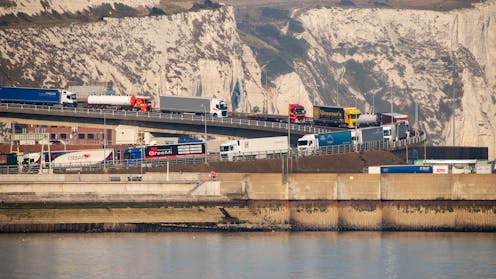New industrial strategy brings Rachel Reeves’ securonomics to life – but will it protect Britain from more supply chain shocks?
- Written by Phil Tomlinson, Professor of Industrial Strategy, Co-Director Centre for Governance, Regulation and Industrial Strategy (CGR&IS), University of Bath

Brexit[1], COVID, the war in Ukraine and now Trump’s tariffs[2] have all highlighted how vulnerable life in the UK is to disruptions in trade. Everyday items that people rely on can be subject to major shortages, delays and price rises, due to something as simple as a ship getting stuck in a canal[3].
This is because the UK is hugely reliant on other countries to provide much of what it needs. Medical supplies, cars, electronics and fruit are just a few of Britain’s favourite things that it tends to buy in from elsewhere.
Global supply chains deliver lower prices and wider choice[4] to consumers but they are also often highly complex. In the car industry for example, components may move within and between companies and cross national boundaries many times[5], before ending up in the final assembled vehicle. This can make them vulnerable.
On the domestic front, the UK could still do more to incentivise “reshoring”[18] (bringing some manufacturing or production of goods back to the UK[19]). Reversing decades of decline in these sectors would be challenging, and require a long-term investment in domestic capacity and skills. But it could also deliver a boost to jobs and growth, potentially in parts of the UK which need it most[20].
Given recent geopolitics, the government has also prioritised strengthening the defence supply chain[21], allocating £173 million of new funding on defence infrastructure and skills. Developments are are at an early stage, but the recent UK-EU security and defence partnership[22] is a welcome start. And more work will be needed to make UK-EU collaboration[23] on building a resilient defence industry across Europe[24] a reality.
Supply chains within that industry (and others, such as healthcare) can be vulnerable to cyberattacks and economic coercion[25] from malicious groups and hostile foreign states. So enhancing cybersecurity in logistics and infrastructure will also be critical.
This will mean better protection for ports, customs systems and logistics software. There is some limited additional funding on offer for this, but more will be required, which in turn will open up new opportunities for firms in the cyber industry. Indeed, a “cyber cluster” of businesses is already emerging in central England from the government defence and technology campus at Porton Down[26] in Wiltshire across to GCHQ[27] – the national centre for intelligence and security – in Gloucestershire.
But with still much to do, overall Reeves has been right to stress the importance of supply chains. They are crucial to people’s jobs and homes, the medicines they need and the food they eat. And supply chain security is not just an economic issue. It is a strategic imperative for safeguarding the UK, its businesses and the welfare of its citizens.
The tone of the new industrial strategy reflects Reeves’s “securonomics” rhetoric. But how far this goes in actually strengthening supply chains and boosting their resilience remains open to question, especially in the context of limited resources and a chancellor keen to build a reputation for fiscal prudence[28].
References
- ^ Brexit (www.tandfonline.com)
- ^ Trump’s tariffs (theconversation.com)
- ^ getting stuck in a canal (theconversation.com)
- ^ lower prices and wider choice (www.gep.com)
- ^ many times (publications.parliament.uk)
- ^ Sign up to our daily newsletter (theconversation.com)
- ^ “securonomics” (labour.org.uk)
- ^ industrial strategy plans (assets.publishing.service.gov.uk)
- ^ industrial competitiveness scheme (www.ft.com)
- ^ steel (theconversation.com)
- ^ ceramics (theconversation.com)
- ^ UK plan to cut energy bills for industrial firms threatens to leave small businesses out in the cold (theconversation.com)
- ^ £600 million (www.logisticsmanager.com)
- ^ known as “friendshoring” (www.weforum.org)
- ^ trade deals (www.tradeandbusiness.uk)
- ^ critical minerals (www.ukcmic.org)
- ^ metamorworks/Shutterstock (www.shutterstock.com)
- ^ “reshoring” (www.investopedia.com)
- ^ back to the UK (academic.oup.com)
- ^ need it most (www.bennettinstitute.cam.ac.uk)
- ^ strengthening the defence supply chain (www.defenceonline.co.uk)
- ^ UK-EU security and defence partnership (www.gov.uk)
- ^ UK-EU collaboration (breakingdefense.com)
- ^ defence industry across Europe (www.politico.eu)
- ^ cyberattacks and economic coercion (www.security.gov.uk)
- ^ Porton Down (en.wikipedia.org)
- ^ GCHQ (www.gchq.gov.uk)
- ^ reputation for fiscal prudence (www.theguardian.com)







